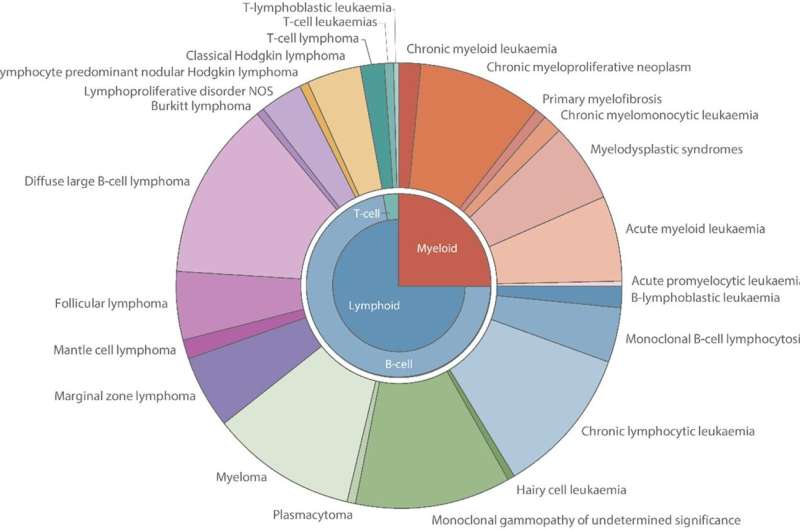Massive expansion of regional health database to help researchers unlock new insights into blood cancers

Researchers at the University of York have expanded a unique regional cancer database, which will help clinicians understand more about conditions such as leukemia, lymphoma and myeloma.
The expanded database will allow researchers at York's Hematological Malignancy Research Network (HMRN) to compare the health of patients with blood cancer to similar people in the general population who are cancer-free.
With 180,000 new cancer-free cases now added to the database, the researchers say these comparisons will help them discover more about how blood cancers relate to other conditions and illnesses, as well as the impact of treatment.
The people in the database live in the Yorkshire & Humberside region covered by HRMN.
Served by 14 hospitals, HMRN's population of 4 million people is broadly representative of the U.K. as a whole (in terms of sex, age, socio-economic indicators and healthcare).
Researchers say that although the database is regional, the results are applicable across the nation. Their study appears in the International Journal of Epidemiology.
Important connections
Each year in the U.K. around 45,000 new patients are diagnosed with blood cancer. By looking at the cancer cohort and a non-cancer cohort side-by-side, researchers and clinicians can track patterns of severe medical conditions and healthcare activity, allowing them to uncover important connections and areas where extra monitoring and care may be needed.
Around 2,500 patients are diagnosed with a blood cancer each year in the HMRN region, and all of these are included in the database, regardless of their age, sex, or treatment. This vital information is shared with researchers, clinicians, patients and commissioners to give them the best picture of these diseases across the population.
Fantastic resource
Professor Eve Roman, Director of HMRN and of the Epidemiology and Cancer Statistics Group at the University of York said: "This expanded database is a fantastic resource, allowing us to compare the health of those who have blood cancer to those who do not—both in the years before cancer is diagnosed and the years after. It provides an unparalleled opportunity to address real questions of concern to clinicians, patients and researchers.
"So far, many of the findings have been striking and unexpected. We are currently examining longer-term health looking, for example, to see whether the health of patients successfully treated for cancer ever returns to the level it would have been, had they not had cancer."
Long-term impacts
Professor Russell Patmore, lead clinician at HMRN, and consultant in hematology and Medical Director for Clinical Support Services at Hull University Teaching Hospitals NHS Trust, said: "The HMRN database is already recognized as one of the best sources of information on people with blood cancer in the world. This expansion takes things to a whole new level, opening up many avenues for research that will ultimately benefit patients.
"Modern therapy is dramatically improving outcomes but little is known about the long-term impacts of treatment on health. This is especially important as many treatments are now being given on a continuous basis and often to older patients who may be especially vulnerable to toxicities that impact on their quality of life. Our cancer-free cohort will allow us to explore this and provide answers that would never be available from clinical trials."
More information: Eve Roman et al, Cohort Profile Update: The Haematological Malignancy Research Network (HMRN)'s UK population-based cohorts, International Journal of Epidemiology (2022). DOI: 10.1093/ije/dyab275


















